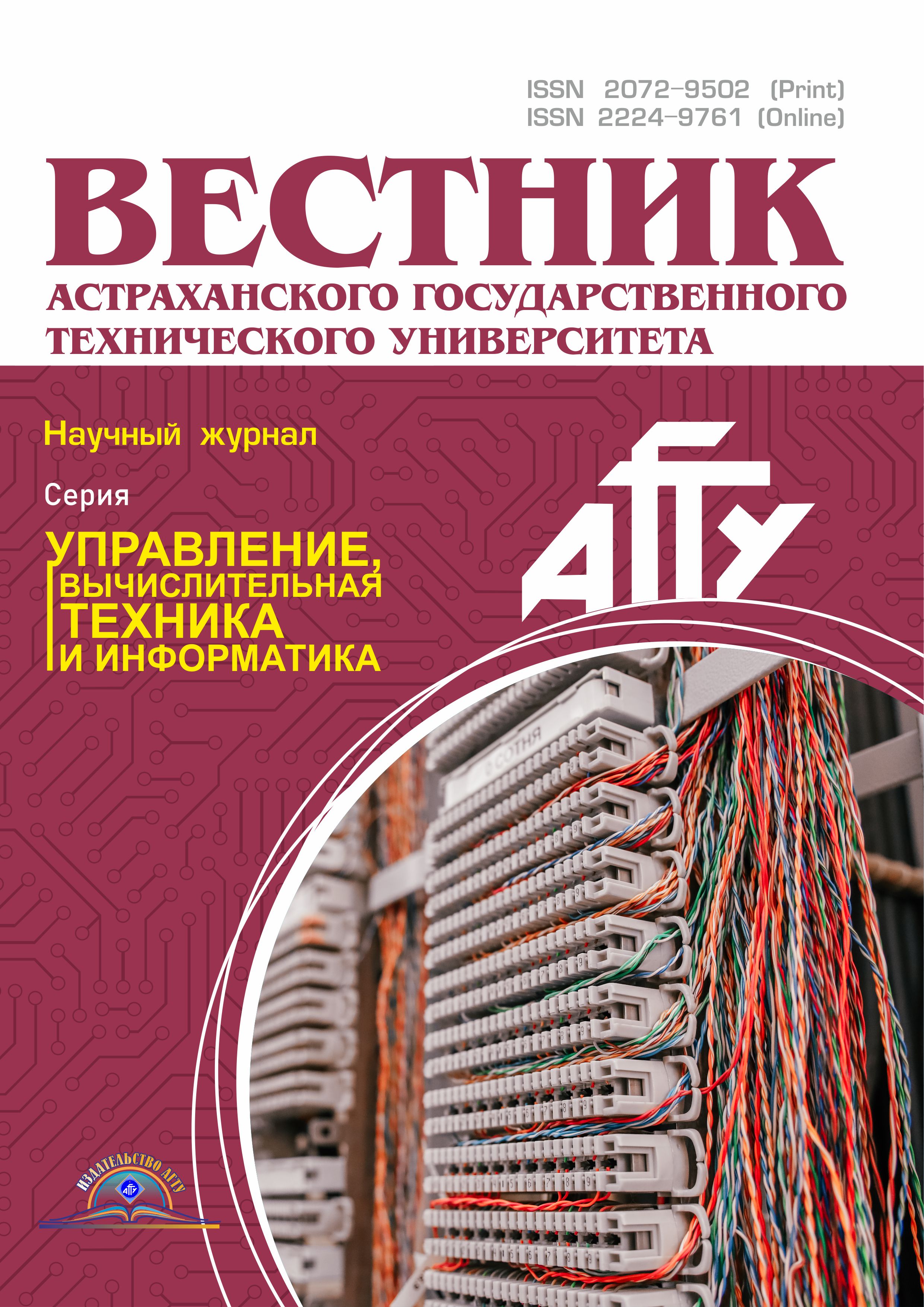VAK Russia 05.13.01
VAK Russia 05.13.06
VAK Russia 05.13.10
VAK Russia 05.13.18
VAK Russia 05.13.19
UDC 681.5
CSCSTI 20.01
CSCSTI 28.01
CSCSTI 49.01
CSCSTI 50.01
CSCSTI 82.01
The current task is to develop an optimal control system for the catalytic reforming process, which ensures the achievement of optimal ratios of the octane number of gasoline and production costs. The formulation of the problem of optimal control of the catalytic reforming process is performed, which is distinguished by using the generalized optimality criterion as the target functional. A hybrid mathematical model of the catalytic reforming process has been developed, which takes into account the influence of parameters characterizing production costs and the octane number of gasoline on the efficiency of the process and makes it possible to calculate the values of the generalized optimality criterion depending on the values of the input variables of the process. Based on LP-35-11/1000 model for installation, there have been obtained the maximum annual costs of 4.05 billion RUB and the minimum octane number of gasoline 92.83. A multicriterial choice of the temperature control system at the exit from the furnace is fulfilled. The algorithm for determining the settings of the temperature regulator at the exit from the furnace in various modes of the catalytic reforming process is synthesized. The method of optimal control of the catalytic reforming process is developed, which is characterized by the consideration of expert information in the formalization of fuzzy goals and constraints in process control and allows to calculate optimal control actions, according to the Bellman-Zade scheme depending on the values of the input variables of the process. Based on this technique, a vector of controls corresponding to the minimum of the generalized optimality criterion I = 0.964 is determined. The search of Pareto-optimal solutions for controlling the catalytic reforming process was carried out. Positive effects were obtained using the developed system of optimal control of the catalytic reforming process: decrease in average costs by 0.33 million RUB; increase in the average octane number by 0.53; decrease in the average value of the generalized optimality criterion by 0.025.
catalytic reforming, generalized criterion of optimality, Pareto optimal solution, hybrid model, classical PID controller, fuzzy PID controller, optimal control system
1. Imashev U. B., Tiurin A. A., Udalova E. A. Osobennosti razvitiia protsessa kataliticheskogo riforminga v Rossii [Peculiarities of the development of the catalytic reforming process in Russia]. Bashkirskii khimicheskii zhurnal, 2009, vol. 16, no. 4, pp. 184-186.
2. Sharipov R. A., Sidorov G. M., Zinnatullin R. R., Dmitriev Iu. K. Rol' protsessa kataliticheskogo krekinga v proizvodstve vysokooktanovykh avtomobil'nykh benzinov [The role of the process of catalytic cracking in the production of high-octane gasolines]. Sovremennye problemy nauki i obrazovaniia, 2015, no. 1-1, p. 134.
3. Ivanchina E. D., Deriglazov V. V., Zanin I. K. Povyshenie tekhniko-ekonomicheskoi effektivnosti kataliticheskogo riforminga s ispol'zovaniem komp'iuternoi modeliruiushchei sistemy [Increase of technical and economic efficiency of catalytic reforming using a computer modeling system]. Izvestiia Tomskogo politekhnicheskogo universiteta. Inzhiniring georesursov, 2011, vol. 319, no. 3, pp. 105-109.
4. Protalinskii O. M. Proverka dostovernosti pervichnoi informatsii v ASU TP s ispol'zovaniem nechetkikh mnozhestv [Verification of the reliability of primary information in the process control system using fuzzy sets]. Izvestiia vysshikh uchebnykh zavedenii. Severo-Kavkazskii region. Seriia: Tekhnicheskie nauki, 2003, no. 3, p. 60.
5. Litvinskaia O. S. Formalizatsiia priniatiia reshenii na osnove tselevogo funktsionala [Formalization of decision-making on the basis of the target functional]. XXI vek: itogi proshlogo i problemy nastoiashchego plius, 2012, no. 1 (5), pp. 74-79.
6. Dzhambekov A. M. Upravlenie protsessom kataliticheskogo riforminga na osnove ekspertnoi informatsii [Controlling the process of catalytic reforming on the basis of expert information]. Novye materialy i tekhnologii: sostoianie voprosa i perspektivy razvitiia: sbornik materialov Vserossiiskoi molodezhnoi nauchnoi konferentsii (Saratov, 24-26 iiunia 2014 g.). Saratov, OOO «Izdat. tsentr «Nauka», 2014. Pp. 382-387.
7. Vlasov S. S., Shumikhin A. G. Modelirovanie protsessa otbenzinivaniia nefti pri prognozirovanii pokazatelei kachestva benzina [Modeling the process of oil stripping while predicting the quality of gasoline]. Vestnik Saratovskogo gosudarstvennogo tekhnicheskogo universiteta, 2012, vol. 1, no. 1 (63), pp. 90-94.
8. Dzhambekov A. M. Mnogokriterial'nyi vybor sistem avtomaticheskogo regulirovaniia tekhnologicheskikh parametrov v usloviiakh neopredelennosti [Multicriteria choice of systems of automatic control of technological parameters under conditions of uncertainty]. Nauchnye issledovaniia i perspektivnye proekty - 2016: sbornik trudov I Nauchno-prakticheskoi konferentsii aspirantov, prepodavatelei, uchenykh (Ufa, 26-29 aprelia 2016 g.). Ufa, OOO «Klaud Kepital» Publ., 2016. Pp. 95-105.
9. Dzhambekov A. M. Nechetkaia sistema upravleniia protsessom kataliticheskogo riforminga [Fuzzy control system of the catalytic reforming process]. Prikaspiiskii zhurnal: upravlenie i vysokie tekhnologii, 2015, no. 4 (32), pp. 268-280.
10. Vorobovich N. P. Primenenie teorii optimal'nogo upravleniia dlia resheniia mnogokriterial'noi zadachi setevogo planirovaniia s nechetkimi ogranicheniiami po resursam [Application of the optimal control theory for the solution of the multicriteria network planning problem with fuzzy resource constraints]. Vestnik Krasnoiarskogo gosudarstvennogo agrarnogo universiteta, 2009, no. 8, pp. 15-18.
11. Shumikhin A. G., Vialykh A. G. Formirovanie funktsii prinadlezhnosti dlia algoritma nechetkogo upravleniia tekhnologicheskim protsessom kataliticheskogo krekinga [Formation of membership functions for the algorithm of fuzzy control of the technological process of catalytic cracking]. Izvestiia Tomskogo politekhnicheskogo universiteta. Inzhiniring georesursov, 2010, vol. 316, no. 5, pp. 132-136.















